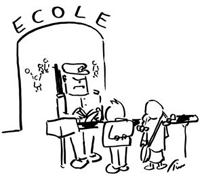
For a good ten years a number of countries, particularly member countries of the Organisation for Economic Cooperation and Development (OECD), have been involved in a new round of reform of their educational systems. As part of this now recurring exercise, EIP continues to pressure countries to integrate human rights education within the general schema of their educational politics and training programmes. In doing this, we are pursuing one of the original objectives of EIP since its creation in 1967. However we also know from experience that this involves long and exacting work, which has not as yet produced all the hoped-for results. More
 For a good ten years a number of countries, particularly member countries of the Organisation for Economic Cooperation and Development (OECD), have been involved in a new round of reform of their educational systems. As part of this now recurring exercise, EIP continues to pressure countries to integrate human rights education within the general schema of their educational politics and training programmes. In doing this, we are pursuing one of the original objectives of EIP since its creation in 1967. However we also know from experience that this involves long and exacting work, which has not as yet produced all the hoped-for results. More
For a good ten years a number of countries, particularly member countries of the Organisation for Economic Cooperation and Development (OECD), have been involved in a new round of reform of their educational systems. As part of this now recurring exercise, EIP continues to pressure countries to integrate human rights education within the general schema of their educational politics and training programmes. In doing this, we are pursuing one of the original objectives of EIP since its creation in 1967. However we also know from experience that this involves long and exacting work, which has not as yet produced all the hoped-for results. More
Any reflection on learning to live together in school cannot avoid a reasoned critical review of the matter of discipline which, in its various forms, is exercised by adults in positions of authority.
According to Denis Jeffrey, classroom authority is problematic. The evidence confirms that a teacher no longer embodies “natural” authority – that is, believed by the students to come from him personally. This type of authority, which was imposed principally by means of fear and constraint, certainly cannot be revived. Along with Francois Dubet, Jeffrey even questions whether this seemingly natural authority was only a mirage, as it rested on a legitimacy maintained by the institution. More
